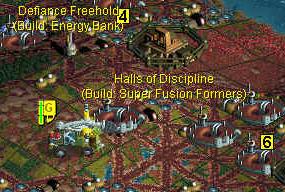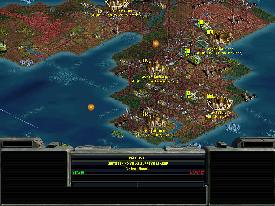The Magnum Opus of the Alpha Male?
First the Earth was formless and void, a gravitational globule in the swirling fiery mists of Sol. Then the globule formed into a molten flaming sphere in space. After that, the planet cooled. Hydrogen and oxygen combined; their molecules condensed from vapor to water, forming the Earth’s oceans. In the chaotic landscape, life formed, evolved and grew. Life became more complex, more advanced. Life at last became human. Many thousands of years later, billions since the beginning, humans played through their history.
This began with a VGA slideshow intro of the formation of Earth, the start of the great Civilization. The people rejoiced and were happy, especially happy to be provided with an award-winning sequel in Civilization 2. Then Sid Meier, the great game’s creator, left Microprose, and created a non-official sequel. This sequel deals with what happened to the chosen people, launched into space at the conclusion of the first two games. This is Alpha Centauri, a departure from the series more in name than gameplay.
Sometime in the near future, mankind is on the brink of self-destruction. The United Nations builds a colony space ship to carry the seeds of humanity to Alpha Centauri, a system containing a planet which has been identified as being inhabitable. Along the way, a reactor problem brings the colonists out of hibernation a wink too soon. Over the course of the next forty years, the colonists break into seven idealistic factions, each intent on creating a civilization on Alpha Centauri in their image. When the ship finally arrives at Alpha Centauri, the colonists manage to escape, one faction in each of the seven escape pods, just before the ship explodes. The split colonists have made freefall, and all contact with earth has been severed. They are all alone out there.
Aside from the circumstances of the launch (and it being under the purveyance of the United Nations), this plot line is a logical extension of one of the two ‘victory’ conditions found in Civilization and Civilization 2, two of the most honored games ever made. Sid Meier, together with long time partner and co-designer Brian Reynolds, have now crafted Alpha Centauri, the ‘ real’ sequel to the Civilization games.
Alpha Centauri only strays from the Civilization formula by its set up. Instead of moving from the far past to the present as in the Civilization games, the game moves from the near future to the far future, on another world. This changes technological progress from being the tracing of the past to the present within a historical framework, to essentially discovering brand new forms of technology. As a gamer you are not certain where new technology will lead, unless you’d like to do a lot of extra reference reading in the help section of the game and manual.
Also, since the game is more like playing life rather than retelling a story, you now have greater control over certain things. Most noticeably, you can now use technological advancements to design your own units, combining armor types, propulsion types, weapon types, special abilities, and other such traits. The units are represented in 3D, which makes them more customizable than the sprites of yore. In addition to this, infrastructure plays a bigger role in the form of terraforming. Alpha Centauri may be habitable, but it is not entirely hospitable. You must clear dangerous fungus, seed forests to remind you of home, plant farms, level or raise terrain, build mines, and construct roads in order to make this planet the garden spot of universal civilization.
 There are a few other differences. Cities, or outposts as they are now called, may be built underwater, changing some of the boundaries of the game. There are also secret projects which may be conducted, like genetic experimentation of various types to alter your population for the better. These projects take the place of Civilizations’ “Wonders of the World,” but lack the grandeur of those austere structures.
There are a few other differences. Cities, or outposts as they are now called, may be built underwater, changing some of the boundaries of the game. There are also secret projects which may be conducted, like genetic experimentation of various types to alter your population for the better. These projects take the place of Civilizations’ “Wonders of the World,” but lack the grandeur of those austere structures.
The interface has also been improved, being much more comfortable and stylistic than the rather utilitarian interfaces of the Civilization games. Units are now moved via the mouse rather than manually moving them with the keypad. In addition, to ease your micro-management pains, there are now outpost governors, sort of ready made development plans for either discovery, exploration, construction, or conquest. This helpful AI does an admirable job of managing things in the absence of your expert leadership.
Graphically the game is decent, but certainly not spectacular or compelling. The feel is very similar to that of the Civilization games with the exception terrain elevation and a lot of red earth. Sound is also well done.
There are a few quirks in the formula, though. The other factions may be diplomatically irrational at best, utterly insane at worst. They have a habit of proclaiming that their units will crush your army when your forces could eat anything they send at you for lunch. Then they will most likely call you up and offer a technology trade. This is just an example of the underwhelming enemy diplomacy.
The multiplayer is also a little odd. Although this type of game might seem logical for multiplayer, it requires a lot of patience due to its turn-based nature. Fortunately, there is an option to limit turn time length, but this is still an experience pretty much exclusive to the truly devoted.
Alpha Centauri really shines in its depth. The well crafted story, admirable science-fiction world, fully realized scenario, and quality core gameplay are sure to please. In this sense, Alpha Centauri is at least as good a game as Civilization 2. But it is its great similarity that also does it the most detriment. Alpha Centauri simply does not do enough that is new; it just doesn’t innovate enough to earn a higher grade. It is still a brilliant game and a definite recommendation for Civ fans, but not a revolutionary enough experience to share space with its kin on those top ten lists.
-
Fantastic gameplay . . .
-
Great depth and story
-
Satisfying graphics and sound
-
Will unite all the nerds, allowing us to seize control!
-
. . .Just like Civ 2
-
Odd multiplayer
-
Not much new here







